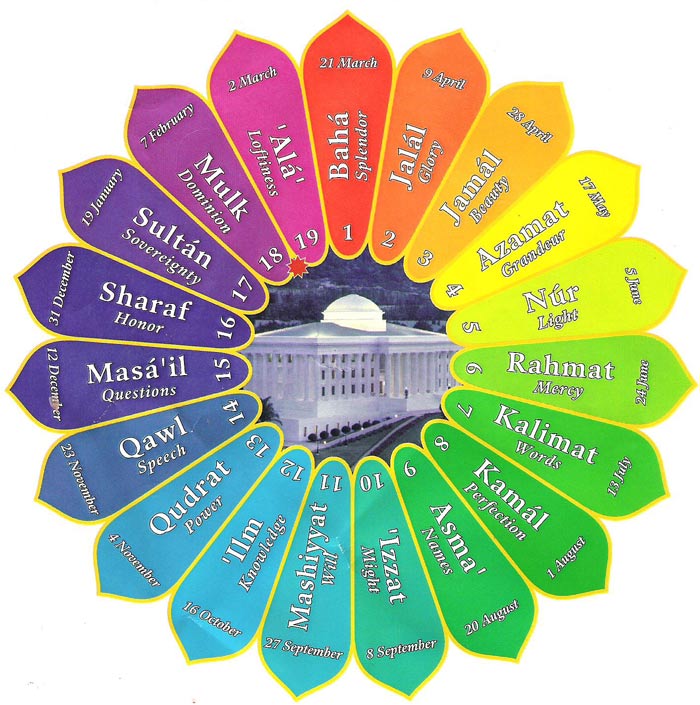The Bahá’í calendar, known as the Badí‘ calendar, embodies an intricate system that interweaves the temporal and spiritual dimensions of life. Each of its nineteen months is imbued with unique attributes and significance. Among these months, the Bahá’í Month of Questions occupies a special place, offering profound insights into the nature of inquiry and understanding. This article explores the various dimensions of the Bahá’í Month of Questions and the associated Godly attribute of questioning.
In the Bahá’í faith, every month is accompanied by a specific attribute of God, which ought to be reflected in the believers’ character and actions. The Month of Questions, which unfolds in the Brilliant (“Ṭáhir”) month, invites an exploration into the power and sanctity of questioning. This month emphasizes not merely the act of inquiry, but also the transformative consequences that arise from pursuing knowledge. Through thoughtful questioning, individuals endeavor to deepen their comprehension of spiritual truths and the universe around them.
First and foremost, it is essential to understand the significance of ‘questions’ within the Bahá’í teachings. Questions serve as catalysts for intellectual and spiritual development, fostering a culture of inquiry, dialogue, and critical thinking. This culture is paramount, as it aligns with the Bahá’í principle of independent investigation of truth. Every person is encouraged to engage with the world and seek understanding rather than adhere blindly to inherited beliefs. Such an approach cultivates a nuanced understanding of spiritual tenets and their application in everyday life.
Moreover, the Bahá’í teachings elucidate the importance of questions in the context of divine revelation. The act of posing questions is tantamount to seeking a deeper relationship with the divine. Sacred texts, including those of the founder of the Bahá’í Faith, Bahá’u’lláh, resonate with the notion that the heart’s yearning for understanding can lead to divine guidance. During the Month of Questions, believers are encouraged to reflect on the inquiries they possess—those burning questions that arise in their souls—and seek divine assistance in finding answers.
Furthermore, the intersection of questions and community knowledge fosters a unique atmosphere within Bahá’í communities. The collective exploration of inquiries allows members to share insights, perspectives, and interpretations of spiritual teachings. This collaborative spirit nurtures a sense of unity and interconnectedness among believers. Structured study circles often emphasize group discussions, where participants are urged to present their questions and engage in collective contemplation. Such an environment bolsters creativity, as diverse viewpoints illuminate aspects of the faith that may not have been previously considered.
What does it mean to ask questions earnestly? During the Month of Questions, adherents are encouraged to practice humility and openness as they engage with their inquiries. An important principle in the Bahá’í teachings is the acknowledgment that knowledge is not static; it evolves. Consequently, questions may often yield more questions, leading to an ongoing cycle of inquiry. This perpetual pursuit is crucial, for it embodies the spirit of lifelong learning—an essential value inherent within Bahá’í philosophy.
In addition to individual and communal dimensions, the significance of questions transcends the personal realm to impact larger societal discourses. The Month of Questions starkly reminds believers of their roles as builders of communities. In this context, the nature of questions can influence local, national, and global dialogues on pressing issues. Bahá’ís are encouraged to pose questions that transcend personal concerns, probing into matters of justice, equity, and environmental stewardship. Through such engagement, the collective inquiry becomes a powerful platform for advocating for change and promoting a harmonious society.
The rich tapestry of the Month of Questions can inspire artistic expression as well. Literature, poetry, and visual arts can all serve as mediums through which questions about the human condition and divine purpose are explored. Celebrating the Month of Questions provides an opportunity for believers to engage creatively with their inquiries, channeling their thoughts into works that resonate on profound levels. Artistic endeavors not only manifest personal reflections but also invite communal engagement, providing a profound sense of connection within the Bahá’í community.
A vital consideration during this month is the manner in which questions are posed. The refinement of inquiry involves a shift from shallow or superficial questions to those that penetrate the depths of meaning. The Bahá’í teachings highlight the significance of intention: to seek wisdom and understanding rather than merely to fulfill an intellectual curiosity. This transformational aspect of inquiry not only shapes the inquirer but reverberates through the community, embodying the notion that thoughtful questioning can uplift the spiritual atmosphere of society.
Finally, as the Month of Questions draws to a close, believers are encouraged to reflect on the inquiries that emerged during this period. This reflective practice not only allows individuals to digest their discoveries but also enables them to set intentions for further inquiry in the months to come. Contemplation on the insights gained fosters a deeper relationship with the questions themselves, creating a dynamic interplay between the self and the divine.
In conclusion, the Bahá’í Month of Questions offers a rich and multifaceted exploration of the Godly attribute of questioning. Through the lens of inquiry, believers embark on a journey that bridges individual growth, communal engagement, and broader societal impact. As they navigate their questions, Bahá’ís reaffirm their commitment to spiritual and intellectual advancement, celebrating the noble pursuit of understanding that resides at the core of their faith.
